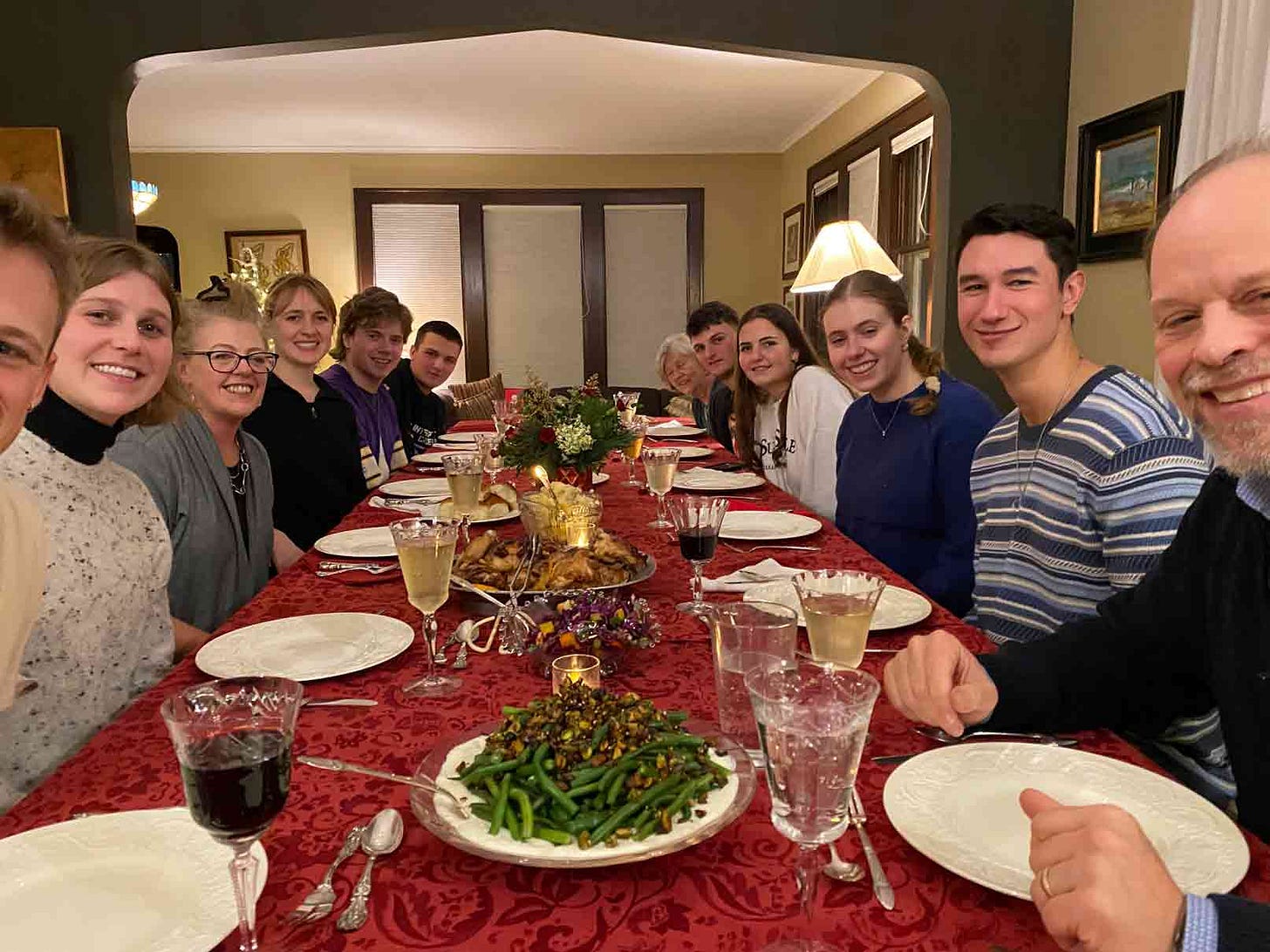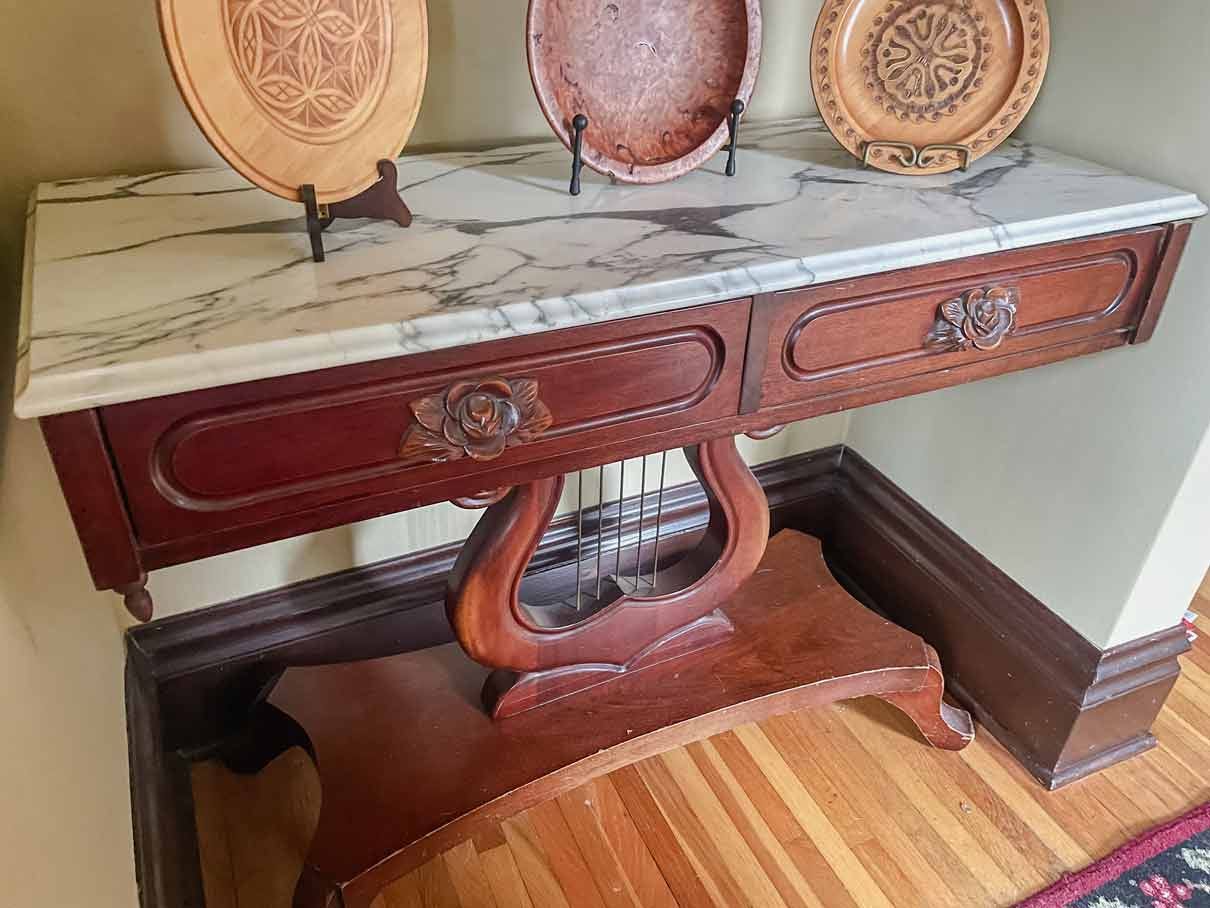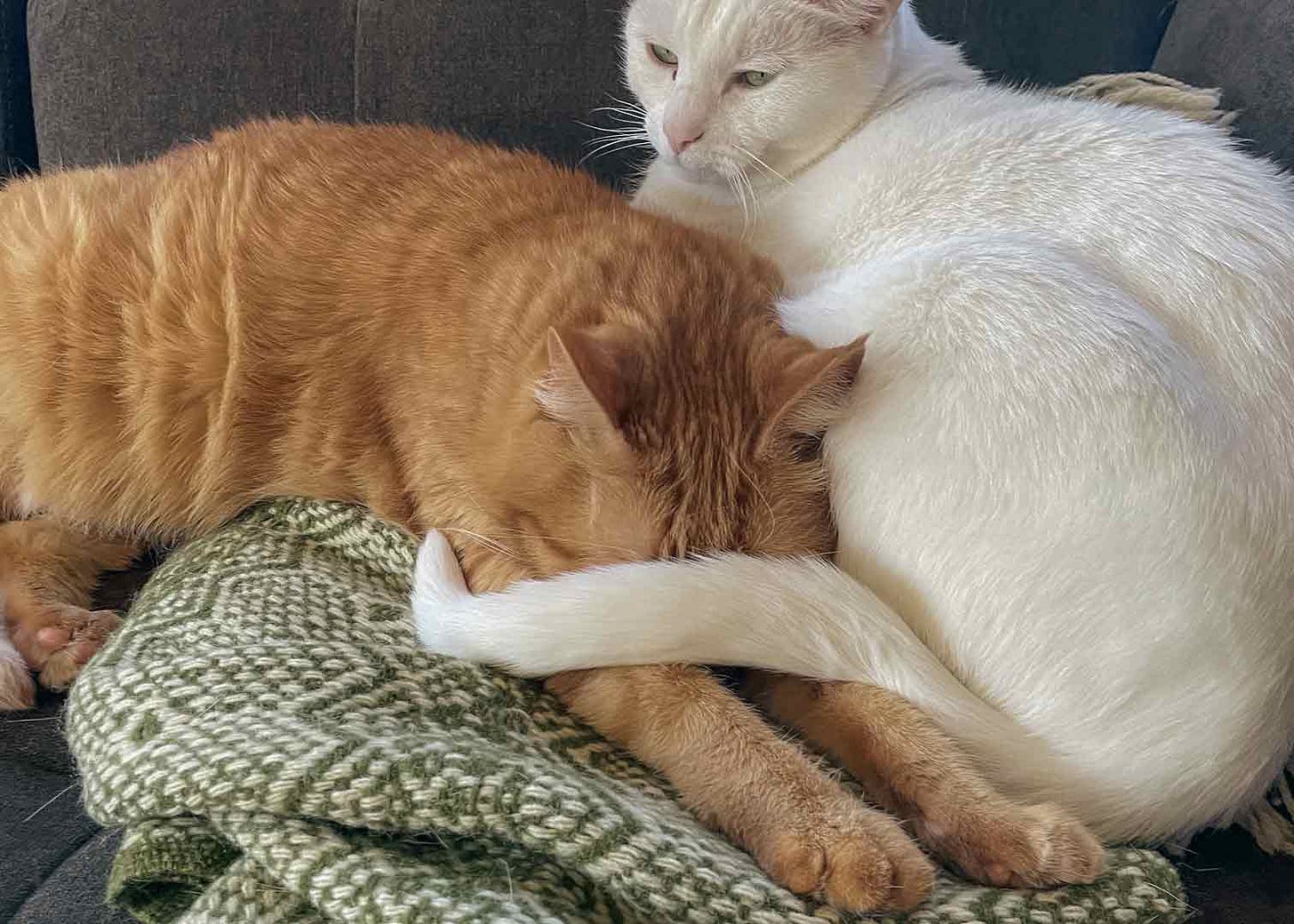I see my grandmother as I walk around the city. Dead five years and never visited New York, yet still I glimpse her face.
It’s the nose that does it, that familiar curve. It catches my eye in window reflections of city buildings and bus mirrors. I turn to meet her, yet—
My eyes recognize the reflection as my own, and she vanishes.
The older I get, the more I see her face in mine. Every day I wear this ring she left me, Black Hills gold. It’s of two leaves connected in the middle. They point in opposite directions.
Born 60 years apart, we were alive together for 21. One headed into this world, one headed out. Touching in the middle, a brief overlap. Two leaves, same form, different colors.
Hands holding mugs in cafés, swiping metro cards. I catch glimpses of people’e jewelry every day and wonder what lives those jewels saw first.
This is beauty. It holds depth in its simplicity.
I love cleaning up after Christmas dinner.
This year I washed dishes as my mom dried and dad put away. My cousins stripped the tablecloths and napkins, uncle played guitar from the sofa, maternal grandma and brother and sister-in-law chatted and coddled their 15-year-old mini poodle who now wears diapers.
My hands turned pruney as I washed cake crumbs from the china. This set belonged to my great-grandmother Peg, who died before my paternal grandma turned 10. I have so many questions for her. What did her world sound like, what thoughts swirled in her mind as her hands turned pruney in soapy water when it was she who washed these dishes after a holiday meal?
So many questions, and I will never have answers. But we have her china, and I spend time with her in my imagination each time these plates host another Christmas dinner and bring us all together to carefully handwash and dry and put away for the next meal, safe in their wooden case.
The ring, the dishes. Objects that have held generations of fingerprints of hands that will never all get to touch. Yet through these objects, we almost can.
Years ago, my mother (who is still in perfect health) told my brother and me to start choosing items we want in the will. I refused to think about my parents dying and declined to participate in such an activity.
And then, I told her to put my name on her grandma Ruth’s mahogany and marble entryway table.
When I visit home, I admire this table’s beauty and wonder how it looked in Ruth’s home. Then something in me throbs with gratitude, knowing I’m still living in the moments where it doesn’t yet belong to me.
I’m aware that one day it will. I know how inheritance works in this world, that there’s no point in fearing the future or nature’s movement, and that gain and loss are two unavoidable parts of every story.
Sometimes the thought of life moving forward rises up and chokes me, and I want to grab it and hold it down or—since I can’t—ignore it for as long as possible. But, I choose that pain of knowing over the comfort of ignoring, because it’s that same knowing that pulses as fear and pain which also swells as love when I wash dishes after Christmas dinner in a house filled with those I cherish.
It is a tragedy that we sometimes forget to treasure the storyline while we are living it.
This circulating post is a laugh, but makes me sad:

I imagine three generations forward. What items will we give them to be remembered? IKEA does not belong in a will.
Being remembered is not a selfish act, a denial of the impermanence of life — rather, it’s a gift to those after, a reminder that they come from something, that their life does not need to be a blank slate on which they must figure it all out alone. That much of what makes up their life was living before they were even a thought, and parts will live on when a thought is what is left of them.
I am of the generation who hears the word “story” and thinks of a 10-second clip uploaded to Instagram for a mere 24 hours to be seen by many and treasured by none.
I am of the generation that will orphan their furniture and dishes without much thought. We won’t think twice about the Wayfair table that held our Target wine glasses and IKEA coffee mugs—the items that once allowed us to share a meal with friends—when they sit broken and rotting in a landfill, alongside the bones of other unloved objects that were once part of a home.
Broken, because they were never built to last.
Built to be bought, not beloved.
I fear we are losing touch with the stories around us. Many today feel we are surrounded by a world rapidly falling into disaster; some even feel we will witness its end in our lifetime. Our stories are being co-opted, our connection to what is real and beautiful, diminished. Replaced by information that we can’t wear or pass down. It holds no fingerprints of those who came before, those who shaped us when we were not yet here.
If we lose touch with our stories, will we stop noticing them around us? Will we still catch glimpses of life beyond our own in city windows and bus mirrors?
It is too easy to hate or destroy what does not hold value to us. I don’t want us to stop looking around for wonder, for stories, for joy.
Here I am in a blurry subway station selfie with my great-grandparents’ picnic basket this Thanksgiving, ‘24. It usually holds notebooks, but I needed to bring potatoes and a freshly baked pie to Brooklyn. So, this basket—once used for Midwestern picnics—rode with me on the subway across New York City.
And here, my cats lie snuggled on Christmas Eve in great-grandma Winnie’s handed-down wool blankets.
Baskets, blankets—items we pass down don’t need to be expensive. They just need to be valued, cared for, and made to last so they can preserve our fingerprints long enough that those not yet here can hold them, too.
We can’t control what future generations will treasure or whether they’ll think of us and our grandparents as part of their story. But we can give them a reason to remember by showing we’re thinking of them in how we treat and leave this world. We can give them a chance.
We can create a world where maybe one day, they will wash our china and whisper to us in their imaginations—
What did life sound like, they will ask, when this world was yours?
I will do what I can in this life so that they ask that not with resentment, but with wonder.
Our actions today will become their inheritance. Let them inherit a world of beauty, one that holds depth in its simplicity.
Google says inherit means “to receive or to be left with.” To me, those two hold very different sentiments. I don’t want future generations to be left with. I want them to receive.









I love this post, and been thinking about how objects carry memories, and in a way, the stronger the object, the longer the memories last.
“The items that once allowed us to share a meal with friends—when they sit broken and rotting in a landfill, alongside the bones of other unloved objects that were once part of a home.
Broken, because they were never built to last.” a critique on fast production and a dire reminder for us to be mindful of our purchases.
That made me tear up!